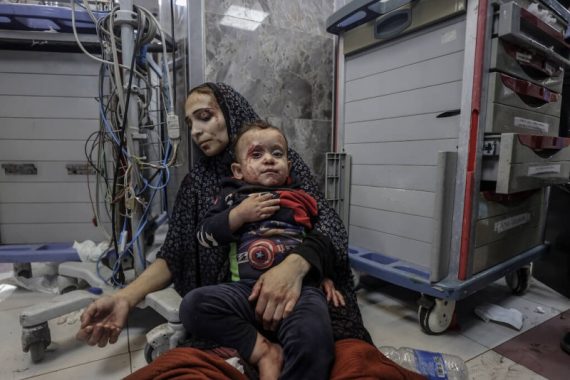by Yousef Aljamal
Reposted from Politics Today with permission from author.
On Sunday, October 15, Israeli warplanes targeted a residential building in Al-Nuseirat refugee camp where dozens of my family members live, killing nine of them. Among the victims were my father’s cousin Azmi Aljamal, 63, a retired nurse, his wife Hanan, 60, and their children Mustafa, 33, Suad, 36, and Sondos, 28. Three of their grandchildren, Omar, Mustafa, and Jana, were also killed, along with their niece Ola, 33, who had sought refuge in her father’s house from where she lives in southern Gaza because of the intense Israeli bombardment.
When I was in Gaza, I remember visiting them during the holidays and seeing a picture of our great-grandfather, Ahmad Aljamal, on the wall. Our great-grandfather was killed in 1948, days before the Zionist militias depopulated my ancestral village and forced its inhabitants at gunpoint “further south” to Gaza, where we have lived for the past 75 years. Today, nothing has changed as Israel demands that Palestinians move from the north of Gaza and Gaza City “further south” in what looks like another horrific scene of the Nakba that continues since 1948.
Even as thousands of Palestinians followed the orders or threats of the Israeli army and moved south, their convoys were targeted by Israel, killing at least 70. It became clear to many Palestinians in Gaza that there is no safe place in Gaza, and that being in Rafah is as deadly as being in Jabaliya, as the Israeli massacres targeted everyone and planted death and fear once again in the hearts of Gazans.
As I turn on the news, I see a heartbroken Palestinian father telling an Aljazeera reporter: “The Israeli army asked us to move south, and we did. They targeted us in Rafah; I ran from death in Gaza City to find it in Rafah. I lost three of my children. I don’t know who to bury first.”
Doctors find their beloved among the dead
As dozens of bodies are brought to Gaza’s hospitals, many of which are on the verge of collapse, tragic stories are repeated. Medical teams sometimes find their own family members among the dead, and burst into tears, unable to treat them or others. As hospitals overflow with corpses, families are urged to take the bodies of their loved ones and bury them as soon as possible. A Palestinian from Gaza posted a video showing the body of his dead father in the back seat as he drove to bury him alone after losing the rest of his family the day before.
In Gaza, Palestinians feel that their deaths do not count. They feel that they are being treated as “human beasts,” as described by Israeli Defence Minister Yoav Gallant who ordered the cutting off of water, internet, and electricity supplies to Gaza without worrying about any reaction from the so-called international community. Even those who keep animals as pets, provide them with food and water—something Israel refuses to do in Gaza. Israel’s ability to shut down life in Gaza is a reminder of its complete control over the coastal enclave and the fact that it is the occupying power there, as it always has been.
My aunt Somaiya appears in a video as I scroll through social media, asking my cousin Ayman to let her touch the body of my cousin Ola, lying on the ground and enclosed in a coffin for the last time. She has tasted death several times. “The dead have survived, the living have not,” comments another cousin, describing how people in Gaza comfort themselves in the face of death while the world watches in silence as Israel kills them. Death also haunts Palestinians in Chicago, thanks to fabricated news from Israel that led to the tragic death of a Palestinian boy named Wadee Alfayoumi, who was stabbed 26 times by a landlord who repeated Islamophobic and anti-Palestinian slogans.


